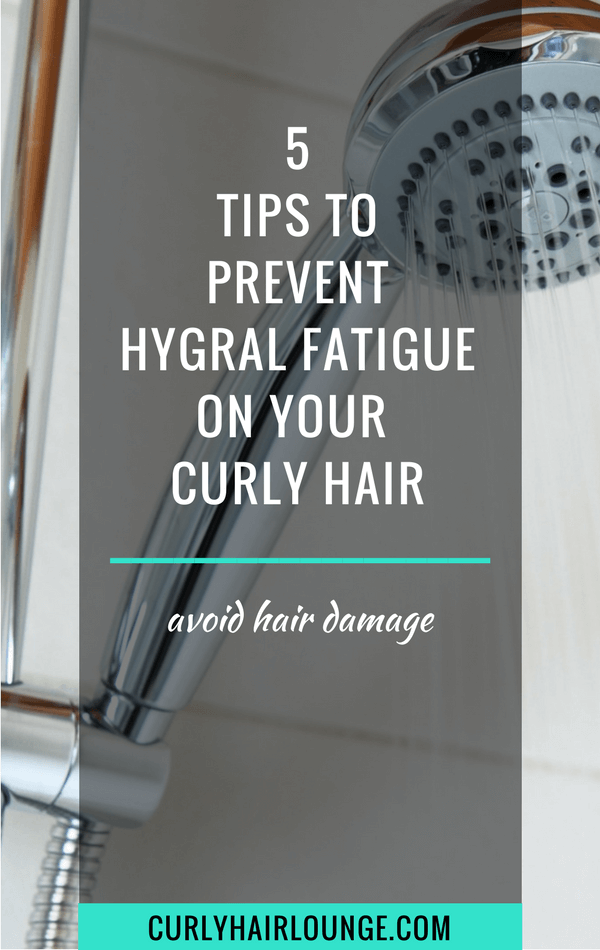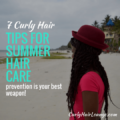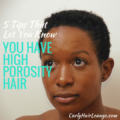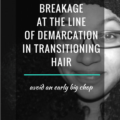If you are used to wetting your hair regularly than your hair is at risk of having or developing hygral fatigue. I have talked about this hair condition in a previous post and you can read more about it on this post. For now, I will briefly say that constantly wetting your hair puts a strain on your hair as it expands when wet and contracts when it’s dry. This constant motion of the hair strands will weaken it, make it lose its elasticity and cause breakage. Just remember what happened to your favourite scrunchie when you were repeatedly using it! So if you are interested in preventing hygral fatigue I will give you a few tips.
1| Pre-Poo
If you read my blog posts you will find that pre-pooing is a persistent theme and rightly so as it helps to protect and strengthen your hair. The use of vegetable oils before washing/wetting your hair will protect it. You can use the extra virgin olive oil (EVOO) you have in your kitchen. However, if you want to prevent hygral fatigue coconut oil is what you’re looking for. This wonder oil is proven to help prevent hygral fatigue and because it has smaller molecules it will take less time penetrating the hair shaft. Other vegetable oils require several hours to do this. Read more to know if you should Pre-Poo your hair.
2| Low pH Products
Our hair has a ph level between 4.5 and 5.5 which is slightly acidic. Anything between 7.1 – 14 is alkaline, and anything between 0-6.9 is acidic. Water, for instance, is neutral and has a ph level of 7. In order to maintain the hair’s pH balance, you need to avoid products that are alkaline. If this happens the cuticle layers of the hair open excessively which will increase water absorption and hair expansion.
Products with a low ph, or acidic products, will help close layers of the hair and, therefore, will reduce water intake. There are a few things you can do to balance ph levels. You can use ph strips to test your products or you can simply use an aloe vera juice (6-6.8 ph) and water solution (1:2) to rinse your hair. Read more about Natural Hair and PH.
3| “Squeeze” Excess Water
Use your microfiber towel to remove excess water from your hair. By doing this you will be reducing weight from your hair because of water intake, therefore, decreasing the stretching and expanding motions.
4| Seal Your Hair
Sealing your hair with a vegetable oil will allow your hair to retain moisture when it’s dry. Once, again you can use any oil you wish, but coconut oil is a vegetable oil that can penetrate the hair shaft and is proven to be effective as a pre-poo and as a post-wash oil by avoiding protein loss. This is basically the thing that provides strength and elasticity to your hair. Really, this one is a no-brainer!!! Read more about using Penetrating or Sealing Oils.
5| Air Dry
Making use of drying tools to quickly dry your hair may sound like a good idea, but it can actually cause more damage. When your hair is wet and drastically dries it contracts too quickly and loses much of its moisture, which can cause breakage. To avoid this, the best option is to air dry. However, if you want to accelerate this process always use your drying tools on a low setting and slowly dry your hair.







22 thoughts on “5 Tips To Prevent Hygral Fatigue”
Nice tips on keeping our Hair healthy even if we are bad about wetting it often. Great Job!
Thank you Michael.
Thanks Michael!
wow this site really has great info on what to do for your hair and you really make it interesting
Thanks David!
Thanks David?
Thanks for the information, Monica! I did not know this. I usually squeeze out all the water I can after I shower. Then, I always air dry. I have very thin hair and put a leave-in conditioner on the damp hair. Appreciate you sharing this!
Hi Jean, applying a leave-in conditioner on damp hair is good and since your hair is thin sealing it with an heavy oil would weight it down. Try coconut or grapeseed oil they’re light. Just protect your hair if you’re wetting it everyday, but it’s always best to try and avoid wetting everyday.
hi Monica!
I had no idea that working with vegetable oil could be so useful! I would have thought it would make it harder to wash your hair as it would make it more slick. But I have heard and read great things about coconut oil. Using it on your hair would be just like using it on your skin
Hello Emily! Coconut oil is a light oil and is absorbed into the hair shaft, so your hair wont feel greasy. As for other oils, I use extra virgin olive oil (evvo) as a pre-poo and wash my hair with a sulfate free shampoo. I don’t feel my hair greasy. If you co-wash (conditioner wash) these products also have cleansing agents but less harsh for the hair. Coconut oil is indeed a wonderful oil.
I am a big fan of air drying, mainly because I don’t have enough time in the morning before rushing off to work. Blow drying also makes my hair feel a bit too dry. Forgot to use my leave in conditioner this morning too 🙁
Hello Emma, you should use a microfiber towel to take excess water from hair once you wash it. These towels are very good and quick doing it, you can then follow with a leave-in and your moisturiser/styler. Try not to wash your hair everyday, but if you must pree-poo it with coconut oil to prevent hygral fatigue.
Hey Moica, I did a bc. I cowash weekly and cleanse with black soap monthly. Will spritzing w/water daily to moisturize be safe?
Hey Lina,
Spritzing your hair with water daily is totally safe, it’s not like you’re drenching it. It’s when you wet your hair (under shower/sink) frequently throughout the week that you’re putting your hair at risk. Wet hair is heavier and if your hair doesn’t have time to dry ’cause it’s always being wet it is constantly under stress, like a stretched rubber band.
Don’t forget to clarify your hair, soap and co-wash still don’t prevent build-up on your hair. For more on clarifying read this post.
Is pre-pooing also required when co-washing or just when shampooing?
Hi Lina,
Pre-pooing is a personal option you may want to include in your hair routine. I personally love it and recommend it to anyone as it increases hair moisture and prevents moisture depletion. If co-washing is your preferred hair cleansing method then, if you want to include this practice in your hair routine, I would do it on my wash day. If it’s just a mid-week co-wash you can skip it but it won’t hurt if you do it, you’ll just have extra work to do. You can read this article to make your pre-poo more effective.
xoxo
Monica
I have been applying coconut oil to my scalp and hair overnight and wash the next day with CG approved shampoo and conditioner and then apply DC styler and let my hair air dry. I do keep a small hair clip to prevent hair on the front from covering my forehead and ears. I do this once a week and still day 2 onward my hair losses elasticity and is dry . Is there something glaringly wrong in my routine ?
Hello Asha, it all comes down to your hair regimen. Is your shampoo efficient enough to remove oils, are you clarifying, what ingredients do you products have (get familiar with ingredients)… Also, what do you mean your hair loses elasticity on day 2 and onward. Hair can’t have elasticity for 2 days and not the rest and then back again when washed. Read this post to get you started.
Coconut oil isn’t good for all types of hair. I have experienced the same thing with it. With some types of hair, the coconut oil will actually block moisture from penetrating the hair shaft and make it even drier than before. I have coarse hair, and it is one of the types that don’t take well to this oil.
https://www.google.com/amp/s/www.allure.com/story/can-coconut-oil-dry-out-hair/amp
Hi Sheryl, coconut oil is an oil that is proven to penetrate the have hair cuticle and help prevent protein loss (i.e. breakage at the cuticle layer level). The only instance I like using a vegetable oil is in a pre-poo, especially before a clarifying session (no LOC or after moisturising or anything like that). What I find when there is a problem with oil, is that most people consistently use raw butters and oils in their hair routines and don’t shampoo their hair properly which leads to problems with hair moisture, dry hair and breakage.
So is the bagging method considered too much moisture on the hair? Will it cause hygral fatigue?
Hi Lina, I don’t know if by the bagging method you mean The Green House Effect if so I wouldn’t advise it. It can indeed cause too much moisture, but not only that it can lead to the development of mould and bacteria on the hair and scalp.